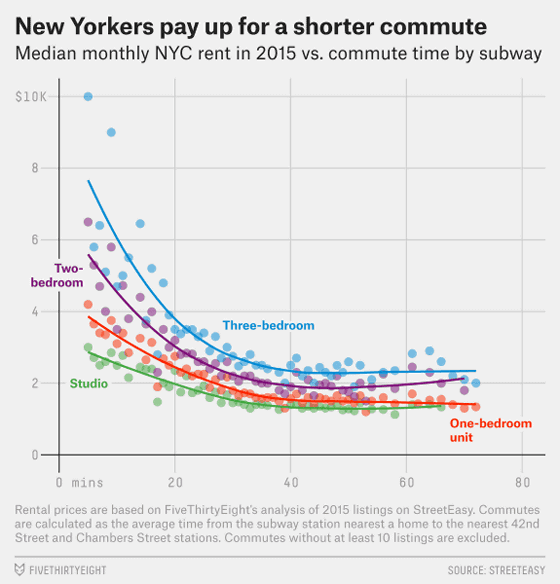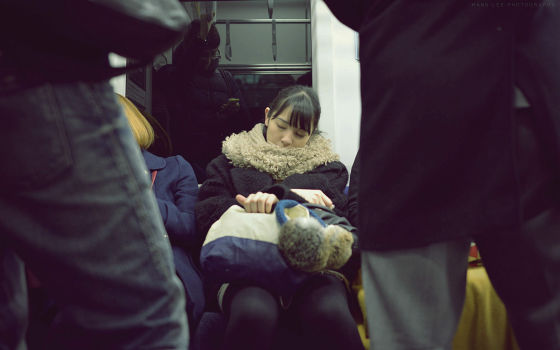How much does New Yorker pay in order to trade off commuting time and rent, cut commute time by one minute?

ByCarlos ZGZ
Web service listing over 175,000 rental properties in New York "StreetEasyAs a result of analyzing the data of New Yorker, it turned out that the most important thing in renting a room is "location". Especially "close to the workplace" is a very important point, people will pay 56 dollars a month (about 5700 yen) to reduce commuting time by one minute. This involves circumstances peculiar to New York.
New Yorkers Will Pay $ 56 A Month To Trim A Minute Off Their Commute | FiveThirtyEight
http://fivethirtyeight.com/features/new-yorkers-will-pay-56-a-month-to-trim-a-minute-off-their-commute/
This is a graph visualizing StreetEasy's data. The vertical axis shows the rent and the horizontal axis shows the commuting time by the subway. As the commuting time gets longer, the rent of the property is decreasing, so you can see that New Yorker places emphasis on commuting time explicitly. Also, it is interesting that the rent and commuting time graph do not show a proportional relationship, and it is also interesting that the property within 30 minutes of commuting is extremely expensive. When commuting time goes over 30 minutes, the connection between rent and commuting time is extreme It becomes thin. In addition, it is said that the data is based on 2015 years.

In other words, assuming that one-way shortening is done twice a day for 20 days, it means that we have secured 40 minutes for 56 dollars a month.
This analysis focused on 63 thousand one-bedroom properties in StreetEasy, which has a large number. The subject property was associated with the nearest subway station from the property, from which the distance between Midtown and Manhattan Downtown in New York was calculated and a regression analysis was done. As a result, StreetEasy found a relationship between a one-bedroom property and the time it takes to travel from Midtown or downtown to the nearest station, "the rent will rise by 56 dollars as the average commute time decreases by one minute." According to the data, many 1-bedroom rental property is used for 2 workers, and we also know that people living near the business center which is the center of New York are wealthy people.
Krishna Rao, an economist at StreetEasy says, "People will soon notice that living in real estate in New York is a trade-off in all." However, the trade-off at this time is not just about commuting time. To say, "It takes less time to commute", that is, that the urban area is close to the house, so there are entertainment such as clubs near the house, necessary things such as restaurants and supermarkets, It means that there is "convenience" that you can go out and play in the reverse. And if you prefer priority to cheap rent rather than this convenience, you will have a house at the edge of the city that will be forced to commute by subway.
In addition, evaluate real estate and consultantMiller Samuel Real Estate Appraisers & ConsultantsMr. Jonathan Miller, who is representative of Jonathan Miller, said he saw the analysis result "to pay 56 dollars a month to shorten commuting time by one minute" as "reasonable," and " Being close to a hub is a very big incentive. " In a city that is easy to commute by car, a place without attractive urban centers, and a lot of wealthy people, the importance is not placed on commuting time when choosing a property, but the means of transportation in New York is Because it is a subway, bus, taxi, etc., it will automatically become an important point.

ByHank Lee
However, this analysis is completely independent of New York City because it does not take into consideration the moving means existing from the home to the nearest station, the speed difference of the train, etc., all workers are not working in Midtown or Downtown There is a possibility that it can not be said that it reflects the real estate situation of.
Related Posts:
in Note, Posted by darkhorse_log







